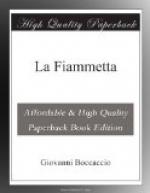While he had the Decameron still in hand, he paused in that great work, with heart full of passionate longing for the lady of his love, far away in Naples, to pour out his very soul in La Fiammetta, the name by which he always called the Lady Maria. Of the real character of this lady, so famous in literature, and her true relations with Boccaccio, little that is certain is known. In several of his poems and in the Decameron he alludes to her as being cold as a marble statue, which no fire can ever warm; and there is no proof, notwithstanding the ardor of Fiammetta as portrayed by her lover—who no doubt wished her to become the reality of his glowing picture—that he ever really received from the charmer whose name was always on his lips anything more than the friendship that was apparent to all the world. But she certainly inspired him in the writing of his best works.
The best critics agree in pronouncing La Fiammetta a marvelous performance. John Addington Symonds says: “It is the first attempt in any literature to portray subjective emotion exterior to the writer; since the days of Virgil and Ovid, nothing had been essayed in this region of mental analysis. The author of this extraordinary work proved himself a profound anatomist of feeling by the subtlety with which he dissected a woman’s heart.” The story is full of exquisite passages, and it exercised a widespread and lasting influence over all the narrative literature that followed it. It is so rich in material that it furnished the motives of many tales, and the novelists of the sixteenth century availed themselves freely of its suggestions.
After Boccaccio had taken up a permanent residence in Florence, he showed a lively interest in her political affairs, and fulfilled all the duties of a good citizen. In 1350 he was chosen to visit the lords of various towns of Romagna, in order to engage their cooperation in a league against the Visconti family, who, already lords of the great and powerful city of Milan, desired to extend their domains beyond the Apennines. In 1351 Boccaccio had the pleasure of bearing to the poet Petrarch the news of the restoration of his rights of citizenship and of his patrimony, both of which he had lost in the troubles of 1323, and during this visit the two geniuses became friends for life. They delved together into the literature of the ancients, and Boccaccio determined, through the medium of translation, to make the work of the great Greek writers a part of the liberal education of his countrymen. A knowledge of Greek at that time was an exceedingly rare accomplishment, since the serious study of living literatures was only just beginning, and the Greek of Homer had been almost forgotten. Even Petrarch, whose erudition was marvelous, could not read a copy of the Iliad that he possessed. Boccaccio asked permission of the Florentine Government to establish a Greek professorship in the University of Florence,




